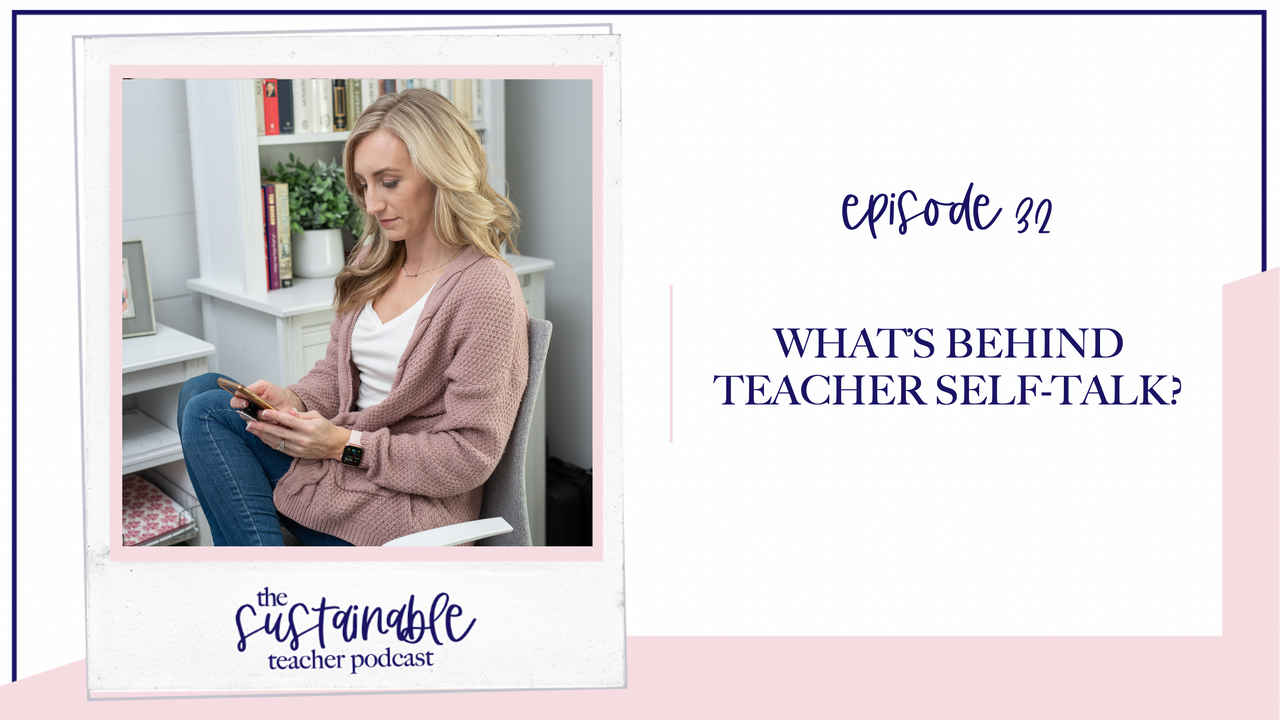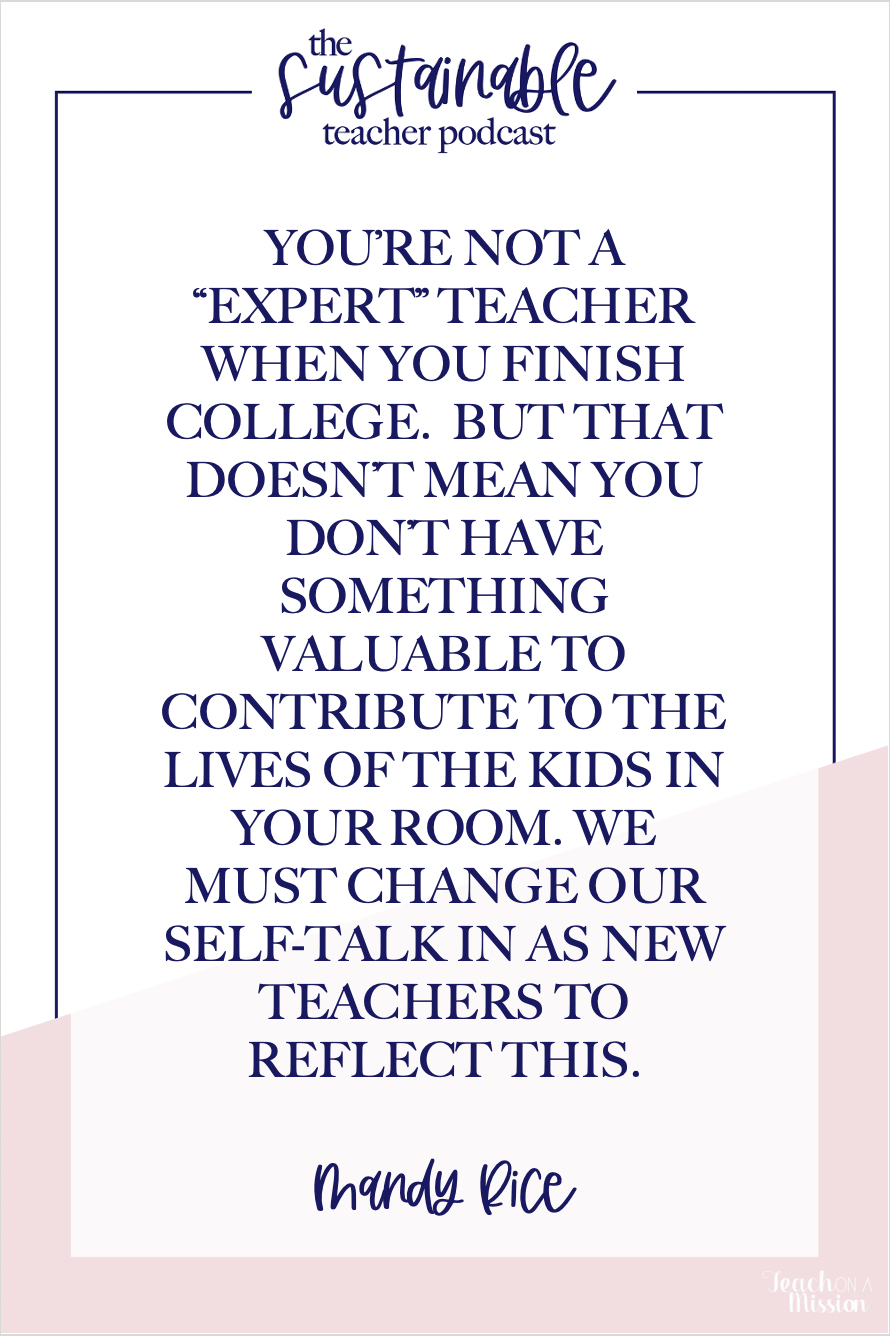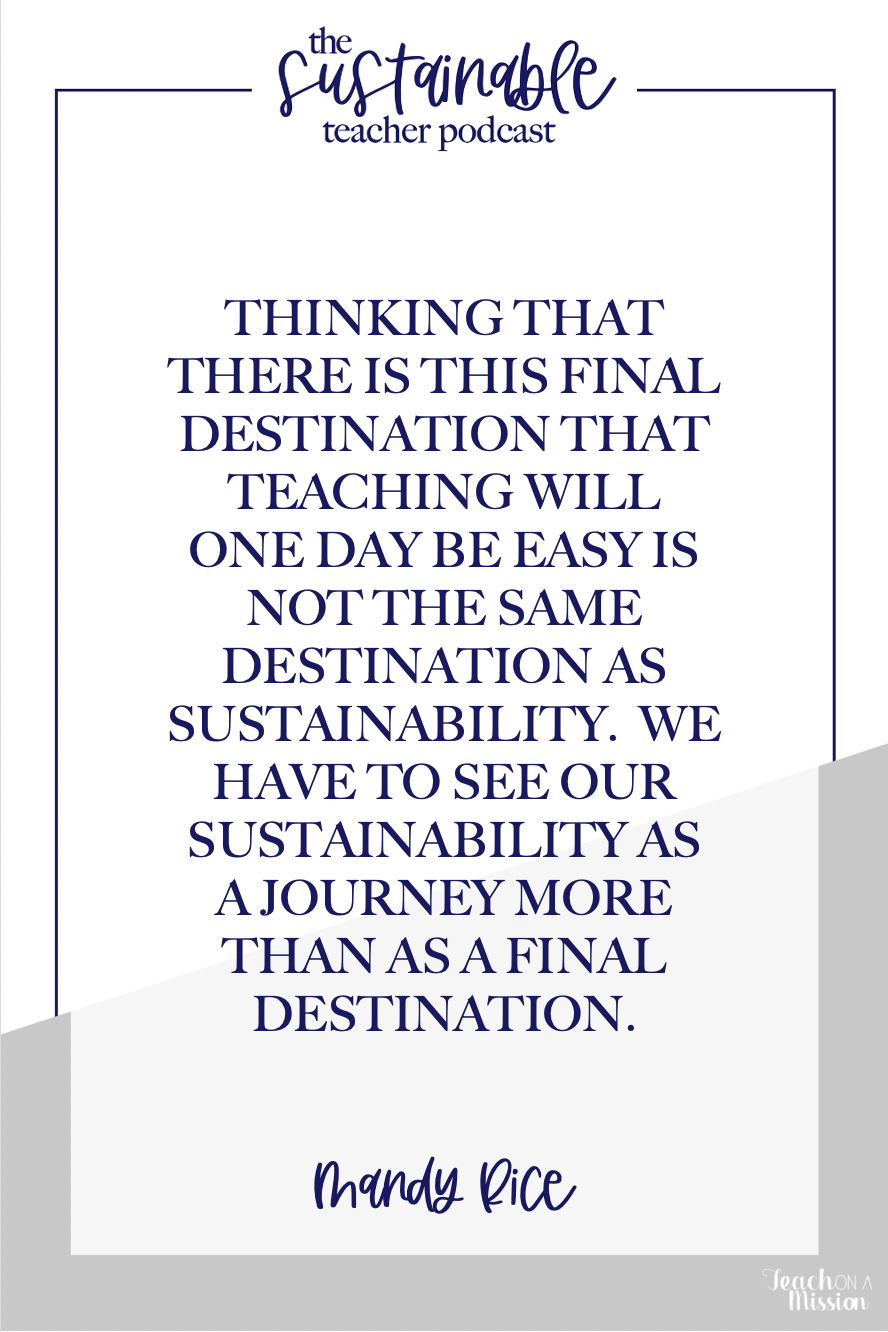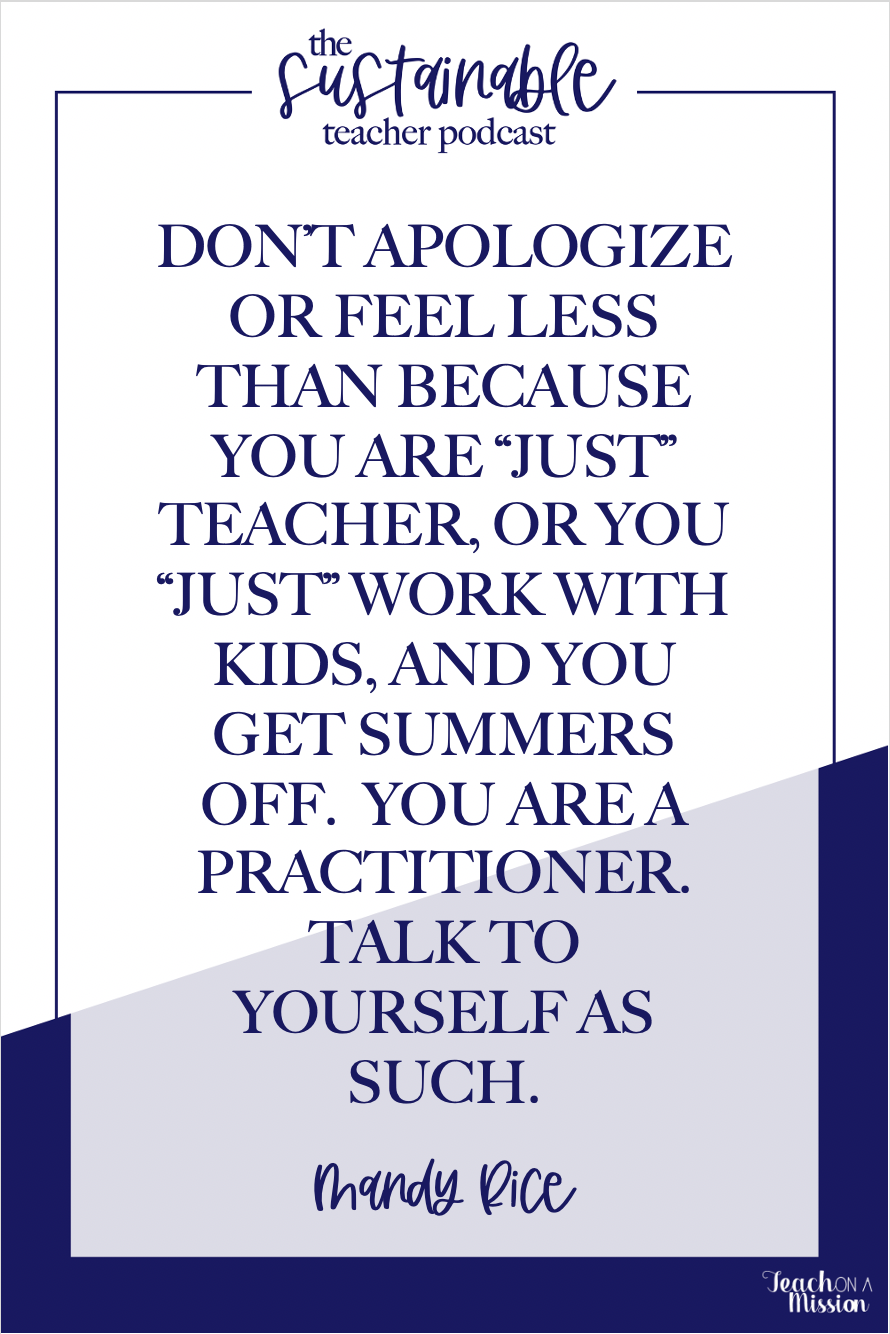What’s Behind Teacher Self Talk?

I was doing a Facebook Live not too long ago, and at the end as I was trying to convey to teachers watching that I too am a teacher, working for myself now, reaching out to teachers with my message of teacher sustainability, and I caught myself saying “I’m just a teacher.” And although I meant it in an endearing, relatable way, it still didn’t sit well with me that the word “just” wanted to creep in there.
Adding the word “just” means I’m nothing more than, or I could’ve done more with my life, but instead I’m “just” a teacher.
Have you ever caught yourself saying this or something like this? Maybe in a circle of friends who aren’t teachers?
Or how about this common saying, “Those who can, do. Those who can’t, teach.”
Now, that’s just a saying, but it’s one we’ve all heard, and I’m sure had aimed at us in some way before even if it was in a joking manner. But I bet it wasn’t laughable.
In many ways I think teachers have assumed these beliefs about teachers, and almost absorbed them as part of who they are as teachers. This is not a conscious occurrence, as if when we become teachers we say to ourselves that we are less-than or some how mediocre in reaching life’s successes, but I do think it’s become part of the common perception of teachers even in the minds of teachers.
In today’s episode we’ll talk about why I think this, how it’s impacting teachers, and what we can do to overcome it.
After listening to this episode, you’ll understand three ways society, and therefore we may perceive ourselves as teachers, and how to shift that perception and our self-talk so that you can step into your amazing role as the number one influence on student achievement in your classroom.
Are you ready?
Let’s do this.

There’s Not Much To Teaching
Flawed perception number one about teachers is that there’s not much to it. It’s just not that complex, and it’s not like you’re a medical doctor, so just know how to handle a group of kids and you’re a good teacher.
How this impacts our perception of ourselves, and therefore our self-talk is we believe that because it’s not so complex (or the perception is such), you should be experts right out of college or after a few years of teaching and don’t need much support beyond that.
You should just get it, and once you get it, you’re good for the duration of your career. No need for support from other teachers, those trying out new strategies, or who have taught the content longer. Just keep on keepin’ on.
This is flawed for so many reasons, and here’s how we need to change this perception and our self-talk.
When we walk out of college and into our first teaching job we feel the pressure, and borderline terror of the fact that not only are we not fully prepared to teach for the first time, but the fact that we aren’t perpetuates the pressure because the perception is that this shouldn’t be this hard.
We start to feel shame around our perceived ineptitudes, as if we have to get it perfect from the start… these are children's’ lives and educational experiences we’re talking about.

So when we have an area where we are needing support, we seek the help and are put down for reaching out, or we avoid seeking help at all to avoid the shame.
Unless of course you are one of the lucky teachers with a colleague or two who gets it, and they are there to bounce ideas off of, and receive feedback from with no judgement and no pressure to just have it right the first time.
We must change our self-talk here. Here’s the truth… when you walk out of college with a teaching certificate you are nowhere near ready to be an expert in your craft. Are you ready to teach kids? Well, you’re as ready as you’ll ever be because there’s only one place to get experience and only one place to start when you have none.
This doesn’t mean that you don’t have something valuable to contribute to the educations of the kids in your room. No, you may not be (or may not have been) an expert educator in that first year or two, but you are building your practice just by being there, showing up, and learning what works.
So instead of feeling down or shameful by not being an expert educator right away, know that your skills and abilities to become one is exactly what make you an expert educator. Your willingness to work on a team and learn from others. Your willingness to try something new, and your ability to respond to the needs of your students the best way you know how… that’s what it’s about.
Can’t Teach an Old Dog New Tricks
Flawed perception number two is for and about our veteran teachers. Let’s say those who have taught 15 to 20 years and up.
Here’s the flawed perception:
Once you’ve been in the teaching game for a while, and you’re a veteran teacher, you’re set in your ways and either can’t or don’t need to improve.
Here’s why this perception is just not good.
For everyone else, those who are not 20 plus years into their teaching careers then believe that there is this final destination, where someday teaching won’t be so hard, and we don’t feel like we have to create anew, recreate, or redo everything because it just wasn’t great the first four times. Or where we’ll have every resource, all materials, and every strategy we’ll ever need under our belt and can just coast by doing the same thing every single year in our class.
Those will be the days, am I right?!?
I’m about to say something here that might sting a little, so hear me out.
Thinking that there is this final destination of finally having everything we need and that one day teaching will be easy is not the same destination as sustainability. That doesn’t mean that sustainability isn’t out there, but we have to stop thinking of our sustainable teaching lives as a destination, and more as a journey.

We are practitioners. We have a practice that is educating other human beings. And there’s two important facts here to consider.
- If we are practitioners, we must hone our craft, upgrade and update our practice with the latest research, just as any other practitioner would, and
- We are teaching human brains… and the human experience, and therefore the human brains we teach are forever and always changing. We have to respond with the times by being, well, responsive to the needs of our students.
I want to make a quick shout out to Anita Fesmire who has been in the education field for 38 years and she’s taking Flipped Classroom Formula as we speak. She is in the 2021 spring cohort and I’m so inspired by her motivation and drive to reach her kiddos.
So instead of seeing sustainability and effectiveness in teaching as a final destination, let’s see it for the ever-changing journey we’re on, and that our practice is always evolving, but also remember we can do and be these things in sustainable ways.
Working with Kids Makes us Less Than Professionals
The final flawed perception I’ll share here today is that because we just work with kids and we build rather rudimentary skills and knowledge within these kids, we are less than other professionals who do “more important” things.
Have you, as a teacher, ever been in a room of professionals like doctors, lawyers, CEOs (or other high up corporate executives), even administrators at the school or district level in our school and district, and felt that your contribution to the topic meant less because you are “just” a teacher?
I’m hoping you haven’t felt this, but I’m betting that if you’re here listening, and you’re a teacher or ever have been that you have felt this sense of inferiority.
It’s as if the perception is that we just teach kids and our contribution to society is only directly with kids, nothing more, so we should apologize for not contributing in other, more valuable ways.
The pay scale difference certainly reflects this perception, and I know that comparing pay of a teacher to a doctor is not comparing apples to apples, but I do believe the significant difference in pay (I would bet it’s an average difference of about 100 to 250 thousand dollars in annual salaries or more) is evidence to the point I’m making here.
Here’s the truth, does it really matter what other people think about us a teachers? Well, yes and no.
First, yes it does because it impacts things like access to resources that allows us to do our jobs well.
But, second, also no, because at the end of the day, I’m going to be a professional and the best educator I know how to be because I’m not doing it for other people. I’m doing it for the children in my classroom who need the stable adult presence and structured educational environment I can provide them.
So I hope you feel empowered in that way, but that doesn’t mean this flawed perception doesn’t impact us.
And here’s how I don’t want it impacting you.
Don’t apologize or feel less than because you are “just” a teacher. People may rant and rave about how we just work with kids, and we get all summers and holidays off, and we just need to make sure we end the day with the same number of kids we had at the beginning… but don’t let that perception seep into what you believe about yourself as a professional.

I’ve said it before and I’ll say it again, you are a practitioner. You are always developing your craft to meet the needs of your ever-changing and evolving students.
The amount of adaptability you must have as an educator deserves respect in and of itself.
Your mindset and how you think about and even talk to and about yourself as an educator has to stop being negative or inferior right this moment. You have nothing to be ashamed of, and should be proud that you’ve sacrificed quite a bit with the choice you’ve made to be an educator, and continue to make each day.
And don’t be ashamed of your years as an educator, as if it’s something to apologize about that we’ve been teaching for more than 10 years, like we’re old, raggedy worn out material that you can’t make anything with. F that. Be proud of your years as a teacher. Be proud that you are seeking opportunities to grow and be supported. Why do you have to be a new teacher to be supported? You’re still doing the same work. Sure you’re more experienced and been around the block, so you’re a bit more efficient, but this stuff doesn’t get any easier with time. The kids just get harder to reach.
And you are here for it.
So here’s my final truth for this episode, teacher-friend. We can’t control how society views what we do, whether that’s society as a whole, our communities, or even the neighbor down the street. But you can control how you think about and talk to yourself as an educator. Remind yourself on a daily basis of the immense, generational impact you are having on your students. Will you be recognized or will ever impact you have even be measurable? Absolutely not, but you are there and you are conquering the world one child at a time, and that is something you should look in the mirror everyday and be immensely proud of.
I hope you’ve enjoyed this episode, and that’s it’s lifted you up amongst the negative self-talk, and I hope you’ll join us inside of Sustainable Teacher Podcast Private Facebook group where we continue our conversations each week.
I’ll see you next week, same time, right here. Bye for now.



